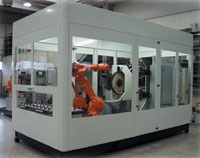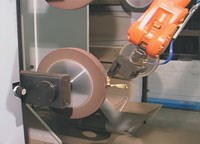Optimizing Craftsmen's Polishing Skills
Robotic polishing cells enable Baldwin Hardware to supply its craftsmen with the tools they need to ensure the timeless quality of the company's product...
Robotic polishing cells are providing Baldwin Hardware Corp. (Reading, PA) craftsmen with a technologically advanced tool that enables them to ensure the Timeless CraftsmanshipTM and high quality of the company's products as well as the quality of worker's jobs. The cells are also helping the company significantly increase production, reduce lead-time and maximize use of plant floor space.
The company is a wholly owned subsidiary of Masco Corp., a world leader in the manufacture of home improvement and building products. The company is renowned for the quality of its architectural hardware and locksets, interior and exterior lighting, fine giftware, bath and cabinet hardware and home fashion accessories.
While maintaining its century-old commitment to uncompromising craftsmanship, Baldwin has also continuously adopted proactive business methods and technological innovations to achieve its growth-focused business goals. Rich Maguire, manufacturing unit manager, explained, "We make all our business and operational decisions based on their ability to maintain and advance our reputation for superior craftsmanship. Consequently, when we considered changing our manual belt polishing process, a key procedure in the production of parts for door pulls, levers, strike and escutcheon plates and turn pieces for locks, we evaluated our options critically."
The polishing process prepares products for other finishing processes. Since the procedure requires the use of abrasive belts, it is not only a strenuous job with ergonomic challenges, but it also creates a dusty environment. Additionally, as a manual operation, even the most skilled craftsmen have difficulty achieving consistency.
Mr. Maguire noted, "Our first step was to determine if robotic polishing would provide the same high quality as the manual operation. After determining that it could, we evaluated the monetary feasibility by assessing the payback period and learned that it was to our advantage to use robotics, since it would allow us to increase our production rate."
From an operations standpoint, Baldwin's concern for its employees' work environment as well as the consistent quality of its products was paramount. Equally important to the company were its business goals, including the cost-effective increase of production, decreased lead times to customers and implementation of cellular manufacturing units to integrate machining, grinding and polishing in a small footprint.
According to Mr. Maguire, "It is important to understand that the advantage of robotics is not the fact that it is faster than a manual operation, but that it enables us to consolidate several processes. This means that we would be able to increase the value-added activities while simultaneously eliminating non-value added activities, specifically the need to handle parts three times.
"Another element of that consolidation is the ability to reduce floor space requirements. Using robotic cells would enable us to increase throughput without increasing the need for plant space."
Investigation and Evaluation
After a comprehensive investigation of options, Baldwin determined that robotic polishing could achieve the same precision and quality as manual belt polishing, while at the same time providing the company with a solution to employee work environment concerns and a vehicle for achieving business objectives.
Mr. Maguire emphasized, "We began evaluating vendors who had the in-depth expertise as well as extensive experience in robotic polishing. However, our first concern was that the vendor's commitment to quality and service was as stringent as ours. Then, we needed to have confidence in a vendor's ability to work with us as a team to integrate the art of our craftsmen with the science of robotics."
Baldwin evaluated proposed vendor solutions based on a list of 20 variables, including cost, type of robot, floor space, lead time, spare part availability, cycle time, warranty, confidence in robot cells, polishing knowledge, programming knowledge, capability to deliver on time, training, dust collection, tooling capabilities and local support availability. "After considering the selection criteria, we selected Pinnacle Technologies Inc. as our vendor," stated Mr. Maguire.
"Since this was our first robotic installation, we wanted proof of the vendor's expertise along with its experience at producing polishing cells, availability of local support and training and programming knowledge. The vendor was able to provide all of that," commented Mr. Maguire.
Representatives from Baldwin also visited some of the vendor's current customers and learned how the cell design's simplicity would enable them to achieve productivity and profitability goals. They also gained first-hand insight into the quality of ABB robots, which are the heart of the cells.
The cells use a common base for the robot, magazine and polishing units, giving the user a modular unit that conserves floor space. The polishing robots address the challenges of polishing operations and help provide the performance and durability that is critical to minimizing downtime as well as reducing training and maintenance requirements.
Art Meets Science
Baldwin's first robotic polishing cell was built and preprogrammed at the vendor's Brescia, Italy, plant. The standard robotic cell includes an ABB IRB 2400-kilo robot, a standard size electrical cabinet on a common base with a control cabinet and an I/O card that enables the unit to communicate with a PLC via two serial line connections. At the U.S. facility the safety fence was added, main power connected and runoff prior to delivery was performed.
Mr. Maguire emphasized, "Teaming with the vendor gave our employees an opportunity to learn how to make programming adjustments and learn the capabilities of robotics. We were also able to take the skills resident in our employees and teach the robots what our employees know."
Expanded Implementation
Based on the successful implementation and performance of the initial cell, Baldwin has already installed eight more robotic polishing cells. Mr. Maguire added, "Since we are moving toward one-piece flow manufacturing, we have decided to develop a retrofitable cell that would give us additional production flexibility and minimize floor space. The vendor is working with us on this project, and we will add five of those cells to our operations this year. These cells will not only help prepare us to meet future customer demand for our products, but also protect our capital equipment investment."
With the introduction of robotic polishing cells, Baldwin has given its craftsmen an innovative tool that continues to help them maintain their unwavering commitment to timeless craftsmanship as well as accelerate the company's productivity and profitability.
Related Content
Defining a Top Shop: Quality, Quickness, Communication, Community
Luke Engineering & Anodizing Co. takes an active role in its community and the industry while also focusing heavily on the quality of its work and employee treatment.
Read MoreAkzoNobel Uses VR for Training Airline Apprentices
The virtual reality technology provides a paint booth and spray gun that enables trainees to work and master their skills without losing parts in the process.
Read MorePCI Names 2023 Board of Directors, Executive Officers
The next individuals serving on PCI's board of directors and as executive officers have been selected.
Read MoreWorkforce Education is Never Finished
Educational initiatives in the industry offer training/learning opportunities for professionals who are entering the industry to seasoned employees as well as introductory programs for high school and college students.
Read MoreRead Next
Delivering Increased Benefits to Greenhouse Films
Baystar's Borstar technology is helping customers deliver better, more reliable production methods to greenhouse agriculture.
Read MoreEpisode 45: An Interview with Chandler Mancuso, MacDermid Envio Solutions
Chandler Mancuso, technical director with MacDermid Envio discusses updating your wastewater treatment system and implementing materials recycling solutions to increase efficiencies, control costs and reduce environmental impact.
Read MoreEducation Bringing Cleaning to Machining
Debuting new speakers and cleaning technology content during this half-day workshop co-located with IMTS 2024.
Read More












.jpg;maxWidth=300;quality=90)













